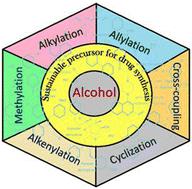当前位置:
X-MOL 学术
›
Chem. Soc. Rev.
›
论文详情
Our official English website, www.x-mol.net, welcomes your feedback! (Note: you will need to create a separate account there.)
Harnessing alcohols as sustainable reagents for late-stage functionalisation: synthesis of drugs and bio-inspired compounds
Chemical Society Reviews ( IF 46.2 ) Pub Date : 2024-03-25 , DOI: 10.1039/d3cs00942d Sourajit Bera 1 , Lalit Mohan Kabadwal 1 , Debasis Banerjee 1
Chemical Society Reviews ( IF 46.2 ) Pub Date : 2024-03-25 , DOI: 10.1039/d3cs00942d Sourajit Bera 1 , Lalit Mohan Kabadwal 1 , Debasis Banerjee 1
Affiliation

|
Alcohol is ubiquitous with unparalleled structural diversity and thus has wide applications as a native functional group in organic synthesis. It is highly prevalent among biomolecules and offers promising opportunities for the development of chemical libraries. Over the last decade, alcohol has been extensively used as an environmentally friendly chemical for numerous organic transformations. In this review, we collectively discuss the utilisation of alcohol from 2015 to 2023 in various organic transformations and their application toward intermediates of drugs, drug derivatives and natural product-like molecules. Notable features discussed are as follows: (i) sustainable approaches for C–X alkylation (X = C, N, or O) including O-phosphorylation of alcohols, (ii) newer strategies using methanol as a methylating reagent, (iii) allylation of alkenes and alkynes including allylic trifluoromethylations, (iv) alkenylation of N-heterocycles, ketones, sulfones, and ylides towards the synthesis of drug-like molecules, (v) cyclisation and annulation to pharmaceutically active molecules, and (vi) coupling of alcohols with aryl halides or triflates, aryl cyanide and olefins to access drug-like molecules. We summarise the synthesis of over 100 drugs via several approaches, where alcohol was used as one of the potential coupling partners. Additionally, a library of molecules consisting over 60 fatty acids or steroid motifs is documented for late-stage functionalisation including the challenges and opportunities for harnessing alcohols as renewable resources.
中文翻译:

利用醇作为后期功能化的可持续试剂:药物和仿生化合物的合成
醇无处不在,具有无与伦比的结构多样性,因此作为有机合成中的天然官能团具有广泛的应用。它在生物分子中非常普遍,为化学库的发展提供了有希望的机会。在过去的十年中,酒精作为一种环保化学品被广泛用于许多有机转化。在这篇综述中,我们共同讨论了2015年至2023年酒精在各种有机转化中的利用及其在药物中间体、药物衍生物和天然产物类分子中的应用。讨论的显着特征如下:(i) C–X 烷基化(X = C、N 或 O)的可持续方法,包括醇的O磷酸化,(ii) 使用甲醇作为甲基化试剂的新策略,(iii) 烯丙基化烯烃和炔烃的合成,包括烯丙基三氟甲基化,(iv) N-杂环、酮、砜和叶立德的烯基化,以合成药物样分子,(v) 环化和环化成药物活性分子,以及 (vi) 醇的偶联与芳基卤化物或三氟甲磺酸酯、芳基氰化物和烯烃反应以获得药物样分子。我们通过多种方法总结了 100 多种药物的合成,其中酒精被用作潜在的偶联伙伴之一。此外,还记录了由 60 多种脂肪酸或类固醇基序组成的分子库,用于后期功能化,包括利用醇作为可再生资源的挑战和机遇。
更新日期:2024-03-27
中文翻译:

利用醇作为后期功能化的可持续试剂:药物和仿生化合物的合成
醇无处不在,具有无与伦比的结构多样性,因此作为有机合成中的天然官能团具有广泛的应用。它在生物分子中非常普遍,为化学库的发展提供了有希望的机会。在过去的十年中,酒精作为一种环保化学品被广泛用于许多有机转化。在这篇综述中,我们共同讨论了2015年至2023年酒精在各种有机转化中的利用及其在药物中间体、药物衍生物和天然产物类分子中的应用。讨论的显着特征如下:(i) C–X 烷基化(X = C、N 或 O)的可持续方法,包括醇的O磷酸化,(ii) 使用甲醇作为甲基化试剂的新策略,(iii) 烯丙基化烯烃和炔烃的合成,包括烯丙基三氟甲基化,(iv) N-杂环、酮、砜和叶立德的烯基化,以合成药物样分子,(v) 环化和环化成药物活性分子,以及 (vi) 醇的偶联与芳基卤化物或三氟甲磺酸酯、芳基氰化物和烯烃反应以获得药物样分子。我们通过多种方法总结了 100 多种药物的合成,其中酒精被用作潜在的偶联伙伴之一。此外,还记录了由 60 多种脂肪酸或类固醇基序组成的分子库,用于后期功能化,包括利用醇作为可再生资源的挑战和机遇。
































 京公网安备 11010802027423号
京公网安备 11010802027423号